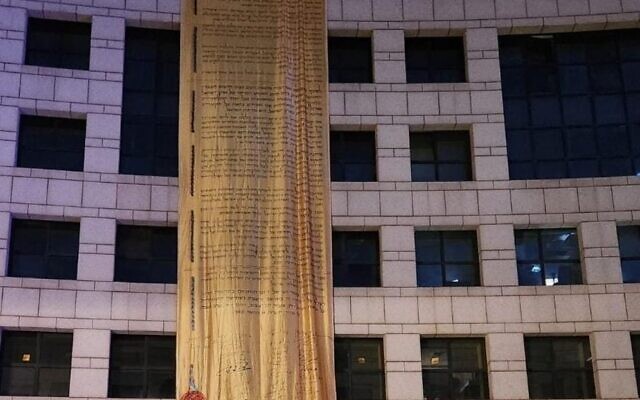Walking Upright
During my years in the Knesset, I concluded that political life has a special curse. Once politicians finally make it into power, they are confronted with decisions that may undermine their life’s work. Perhaps publishing has a similar curse for authors. Daniel Gordis’s newest book celebrates the success of Zionism and the State of Israel at just the moment that Gordis himself seems least certain of that success.
Shortly before his book was published, Gordis joined fellow Israeli-North American authors Matti Friedman and Yossi Klein Halevi in “An open letter to Israel’s friends in North America,” calling upon them to actively protest the attempts of the current government of Israel to push through a radical package of judicial reforms. The letter described their “sense of anguish and anxiety for the future of our country.” Although both the book and the letter were aimed at precisely the same audience, one could hardly imagine a greater difference in tone.
Impossible Takes Longer, published on the occasion of Israel’s seventy-fifth anniversary, argues that one way to think about Israel’s successes and failures is to measure them against the aspirations of Israel’s Declaration of Independence. This turned out to be an extraordinarily prescient choice for Gordis since the Declaration has become a symbol of the protest movement, with a plaque bearing it placed in the midst of the weekly protests, and the text projected on key buildings and scrolled down Jerusalem’s Old City walls.
The book’s greatest contribution is fighting Jewish historical amnesia. Gordis reminds his readers that it is precisely because Zionism has so thoroughly transformed the Jewish condition that Jews can now indulge in thinking that Israel is a failure or no longer necessary. (This reminds one of wealthy heirs who claim not to care about money.)

Gordis structures his book by working through the clauses and consequences of the Israeli Declaration of Independence. The Declaration begins with a grand prologue which was revised by David Ben-Gurion the night before he read it in Tel Aviv on May 14, 1948. In English translation it reads:
The Jewish people was born (kam) in the Land of Israel. Here their spiritual, religious and political identity was shaped. Here they first attained to statehood (bah chai chayeii komemiyut), created cultural values of national and universal significance and gave to the world the eternal Book of Books.
In a beautiful, and, I believe, entirely original literary analysis, Gordis notes that the verb translated as “born” (kam, literally stood up or arose) in the first sentence is echoed by the virtually untranslatable Hebrew phrase in the third sentence describing the attainment of ancient Israelite statehood, whose key word, komemiyut, comes from Leviticus:
I am the Lord your God Who brought you out of the land of the Egyptians to be their slaves no more, who broke the bars of your yoke and made you walk upright (komemiyut) (Lev. 26:13).
Thus Ben-Gurion did not merely invoke the Bible as the “Book of Books” — he also used it to underline the fundamental Zionist argument that peoplehood requires independence, and hence sovereignty, in the Land of Israel. Even though the biblical verse Ben-Gurion was invoking describes a liberation process that took place outside the Land of Israel, Gordis writes, “When Ben-Gurion added that word komemiyut to the draft, he knew very well what he was doing.” As Gordis frames the idea, “peoplehood . . . requires independence. Komemiyut explains kam.”
It is said that the well-fed cannot understand the hungry, and Gordis reminds his comfortable Jewish readers that “one cannot understand the passions at the heart of Zionism without an appreciation of the senses of betrayal and vulnerability that Jews throughout Europe felt.” From lurid, but entirely accurate, descriptions of pogroms to a quotation of Herzl’s pessimistic, but prescient, description of Jewish prominence in fin de siècle Vienna as being “a giant house of cards,” Gordis effectively conveys a sense of the desperate political hunger felt by Jews who had been betrayed by the promise of European emancipation and prevented from walking upright as a people. Even before the Holocaust, Jews were, in Gordis’s words, “victims on call” towards whom cynical European governments could redirect the wrath of their people.
As much as Gordis recognizes the urgent historic necessity of Jewish self-defense, he discusses the Israeli doctrine of “purity of arms” and the question of the extent to which the State of Israel can conduct its warfare “in a uniquely Jewish fashion” without losing the wars. Although a cursory reading of the Bible might yield very different notions of what fighting wars “Jewishly” means, posing the question is in itself very Jewish. I am reminded of the old quip that “Israel is the only country in the world expected to behave like a Christian nation” (the Jesus-of-the-other-cheek kind, not the marauding-Crusader kind). But as Gordis looks to the actual achievements of Israel’s defense, he cannot help marveling that “Israel has moved from being a tiny dot in a sea of hostile Arab states to being ever more tied diplomatically, economically, technologically, and even militarily with countries that not long ago openly hoped that Israel would be destroyed.”
After Gordis describes the many successes of Zionism he turns to the conflict with the Palestinians, which he regards as the underbelly of that success. Gordis twins the competing narratives of Jewish liberation and Palestinian catastrophe in a way that has become common even among Israel’s supporters. In doing so, it seems to me that he fails to appreciate an issue at the heart of the conflict.
Gordis clearly demonstrates that Zionism cannot be understood without appreciating the condition of Jews in Europe and Russia before 1948, but he fails to convey that the conflict cannot be understood without appreciating the historic condition of Jews in Arab and Muslim lands. Without understanding that fourteen-hundred-year history in which Arabs have generally known Jews as weak, stateless, and subject to the mercy of Muslim rulers, it is impossible to understand their violent response to Zionist Jews who expected nothing less than equal status as a nation in the midst of the vast territories conquered for Islam.
When Gordis assesses the Palestinian rejection of partition by asking, “Why would they do otherwise?” he implies that, although both Jews and Arabs were unhappy with the League of Nation’s plan, the Arab rejection of it was as understandable as the Jewish acceptance. But the Palestinian Arabs were unhappy about partition because the only acceptable outcome, from their perspective, was no Jewish state at all.
Gordis goes on to explain that Palestinians learned that violence works from the examples of Israeli territorial concessions after the Yom Kippur War, among other things. But this ignores that what worked for the Egyptians was precisely their limited territorial goals, which allowed for an agreement. The problem is not with the Palestinian means of conducting the conflict—violent or not—but with their end: no Jewish state at all. Gordis acknowledges this possibility, as he does in the aside, “If the Palestinians genuinely seek a state—which they may not . . .” but he refrains from dwelling on its full implications.
Daniel Gordis understands that the power of Zionism was that it was a movement of Jews who realized that “if the Messiah would not redeem the Jews, they would do it themselves.” He also understands that while that redemption has been incomplete, it has nonetheless transformed the condition of the Jewish people both in and outside of Israel. The founding of the State of Israel has done so not only by rendering the Jews more secure, but also by offering a more profound sort of restoration. As Gordis emphasizes, the Zionists aspired to more than Jewish physical safety. They “wanted nothing less than a reimagination from the ground up of what it meant to be a Jew,” and that, according to Gordis, is what they did. He writes: “If Zionism was about creating a new Jew, reviving Jewish civilization, and healing the Jewish people, it has succeeded beyond anyone’s wildest dreams.”
A few weeks after he co-wrote his anguished letter to Diaspora Jews, Gordis could not contain his exuberance at the magnitude of the protests against the Netanyahu government, calling the moment “one of the greatest weeks in Israel’s history,” and proof of the vibrancy of Israeli democracy. Like Gordis, these days many Israelis as well as supporters of Israel oscillate between despair and hope. They would all do well to read Impossible Takes Longer, which ends on a justifiably hopeful note:
Israel’s founders took upon themselves an impossible task. . . . Now it is up to us. . . . It is now our task to leave for the generations that will follow us a Jewish state that both flourishes in the messiness of human history and, at the same time, has inched at least a bit closer to the ever-elusive dream of perfection.
Suggested Reading

Tamar, Helen, and Love’s Ambition
What can Shakespeare’s most unlikely love story tell us about Tamar’s "bed trick" and the fate of the Jewish people?

Israel and the Old-New Middle East
The social and political realities of the Middle East make democracy unlikely. A rough neighborhood may be getting rougher.

In the Beginning, There Was Angst
Where a committed secularist would raise up the literary in place of the sacred, Adam Kirsch’s discussions in The Blessing and the Curse read more like a coda to the sacred scriptures.

The Symbol Catcher
My friends and I took for granted that the connection between the cards and the players they represented wasn’t just arbitrary.
Comments
You must log in to comment Log In